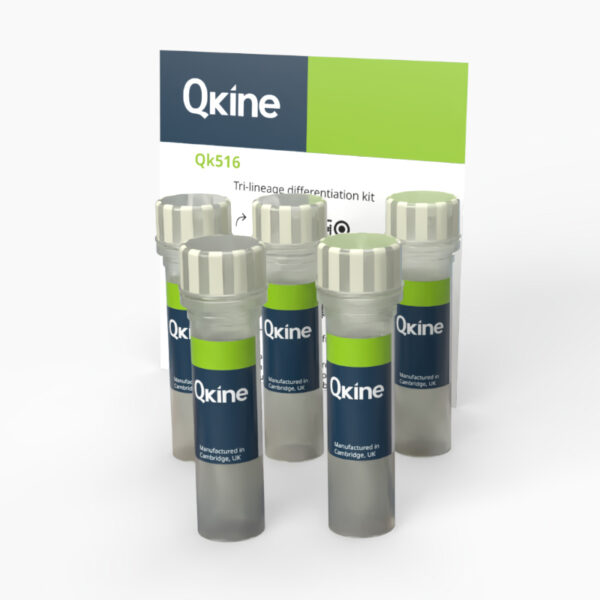Tri-lineage differentiation kit
QK516
Brand: Qkine
For validating the ability of new or established induced pluripotent stem cell (iPSC) lines to differentiate to the three germ layers: ectoderm, mesoderm, and endoderm.
The tri-lineage differentiation kit is designed to validate the differentiation potential of both newly derived and established iPSC lines. This kit enables the evaluation of the ability of iPSCs to differentiate into the three primary germ layers: ectoderm, mesoderm, and endoderm.
The kit includes carefully optimized growth factors required to efficiently guide iPSCs toward one of the three germ lineages. It serves as both an endpoint assay—confirming pluripotency and lineage commitment—and a platform for generating lineage-specific progenitor cells for further downstream applications.
Each kit is sufficient for differentiation of 3x 96 well plates per differentiation, 9x 96 wells total.

Currency:
| Product name | Catalog number | Pack size | Price | Price (USD) | Price (GBP) | Price (EUR) |
|---|---|---|---|---|---|---|
| Tri-lineage differentiation kit | QK516 | 1 kit | (select above) | $ 950.00 | £ 705.00 | € 824.00 |
Note: prices shown do not include shipping and handling charges.
Qkine company name and logo are the property of Qkine Ltd. UK.
Summary
- >98%, by SDS-PAGE quantitative densitometry
- Animal origin-free (AOF) and carrier protein-free
- Expressed in E. coli
- Bioactivity Guaranteed
- Manufactured in Qkine's Cambridge, UK laboratories
- Lyophilized
- See reconstitution instructions for individual kit components
Further quality assays
- Mass spectrometry: single species with expected mass
- Recovery from stock vial: >95%
- Endotoxin: <0.005 EU/μg protein (below level of detection)
Featured applications
- Differentiation of iPSC into endoderm, mesoderm and ectoderm
Kit constituents
- Human activin A – Qk001 – 25 µg
Frequently used to maintain pluripotency in induced pluripotent and embryonic stem cell cultures. It is also used in many stem cell differentiation protocols, including endoderm lineage differentiation and further maturation into hepatocyte and pancreatic cells. - Human BMP-4 – Qk038 – 25 µg
A key regulator of embryogenesis and supports the differentiation of embryonic stem cells and induced pluripotent stem cells. - Human FGF2-G3 (154 aa) – Qk053 – 50 µg
A thermostable engineered form of human FGF-2. Human FGF2-G3 154 aa is the 154 aa mature domain of FGF-2. The functional half-life has increased from <10 h (wild-type) to >7 days (FGF2-G3). - Human noggin – Qk034 – 25 µg
Noggin is used in the culture of intestinal, pancreatic, lung and tumor-derived organoids and the maintenance of undifferentiated embryonic stem cells (ESC) and for stem cell differentiation into neural and microglial lineages. - Human vitronectin – Qk120 – 500 µg
Provides a defined environment that supports the maintenance of pluripotency and is suitable for feeder-free culture, expansion, differentiation, and reprogramming of stem cells.
Protein background
Human induced pluripotent stem cells (iPSCs) are an in vitro model that represent a pivotal breakthrough in regenerative medicine and cellular biology. iPSCs are generated by reprogramming adult somatic cells to a pluripotent state through the introduction of specific transcription factors. Reprogramming iPSCs grants these cells the ability to differentiate into any cell type of the three germ layers: ectoderm, mesoderm, and endoderm. This provides unparalleled potential for disease modeling, drug discovery, and cell-based therapies, all without the ethical concerns associated with using embryonic stem cells [1].
Background references
- Varum, S. et al. Energy Metabolism in Human pluripotent stem cells and their differentiated counterparts. PLoS ONE. 2011;6(6):e20914. doi: 10.1371/journal.pone.0020914